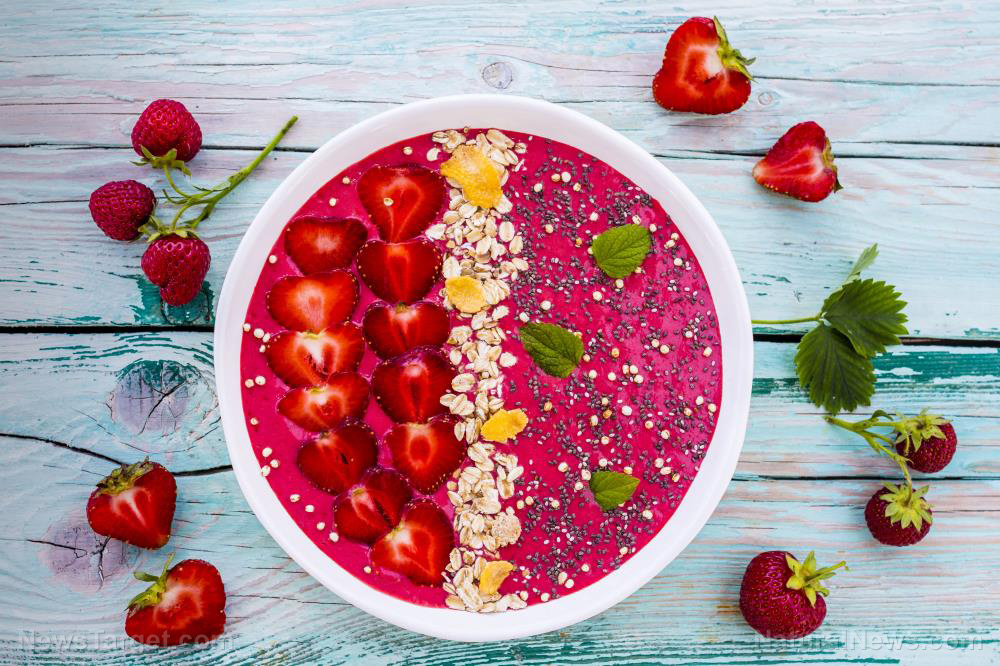Research shows eating berries can help reduce inflammation and health risks caused by obesity
06/23/2022 / By Rose Lidell

The Centers for Disease Control and Prevention (CDC) has reported that over 40 percent of the American population over the age of 40 is currently obese. Most of these people may also be at risk of potentially life-threatening consequences.
Obesity is a major risk factor for chronic degenerative diseases like cancer, dementia, diabetes, heart disease and nonalcoholic fatty liver. But not enough physicians talk about the importance of following a balanced diet to address this problem. Studies suggest that fat cells can trigger inflammation, which is linked to many chronic disease conditions.
Fortunately, research has also shown that consuming berries can offer health benefits, especially when it comes to health risks linked to obesity.
Fat cells and chronic and systemic inflammation
Adipocytes or fat cells do more than just store or release energy. In obese people, fat functions and reacts almost like a separate and complete organ of the body by triggering systemic changes.
Research is helping health experts learn more about why this happens. In a study published in the journal Cell Metabolism, scientists were surprised to discover that obesity makes fat cells act like they are “infected.”
These fat cells can produce the same complex of proteins that they would release if they are under pathogenic attack by viruses or bacteria. This inappropriate response causes overexcited immune cells to react with a “runaway immune response” that then triggers inflammation throughout the body.
Obesity, especially around the abdomen, is also linked to increased plasma concentrations of free fatty acids, which impair insulin sensitivity in the muscles and the liver. This can increase your risk of developing Type 2 diabetes.

Eating berries can make pro-inflammatory “white” fat act more like “brown” fat
Scientists also discovered that there are two types of body fat: “bad” white fat and “good” brown fat. White fat releases harmful inflammation-promoting chemicals, while brown fat promotes fat-burning for energy. Brown fat also helps improve insulin sensitivity.
Brown fat is found in human babies and hibernating animals. Scientists only recently discovered that it also exists in adults.
The benefits of berry extracts can be traced to anthocyanins, a family of natural antioxidant plant pigments that give fruits their vibrant colors. The researchers said berry extracts full of anthocyanins give white fat cells some of the beneficial qualities of brown fat –reducing the size of fat cells, improving insulin sensitivity and improving metabolic status and condition.
This is how natural berry extracts help limit the negative effects of obesity:
- According to a study, strawberry and blueberry extracts reduced weight gain and fat storage while lowering the insulin levels of animals fed a high-fat diet.
- In another study published in the Journal of Agricultural and Food Chemistry, scientists reported that hamsters given mulberry extract for 12 weeks experienced reduced body weight and visceral fat, along with decreased levels of triglycerides and cholesterol.
Berries help boost gut health, protect your arteries and lower excess cholesterol levels
Obesity usually disrupts the balance of your gut microbiome or the community of bacteria living in your gastrointestinal tract, which can affect your overall health. The disruption of the gut microbiome is linked to inflammation.
Supplementation with blueberry extract can help reduce inflammation by improving bacterial balance and composition. Additionally, berry supplements also help reduce metabolic endotoxemia, a condition where toxic bits of bacterial membranes enter your bloodstream by way of a “leaky gut” or increased intestinal permeability.
Consuming blueberries have been found to prevent damage and reduce inflammation in the fragile linings of arteries.
Berry extracts can also boost the activation of 5′ AMP-activated protein kinase (AMPK), an important enzyme that promotes youthful cellular metabolism. In a randomized placebo-controlled trial, scientists reported that a mixture of several different berry anthocyanins helped minimize inflammatory markers in participants with high cholesterol.
Nonalcoholic fatty liver disease (NAFLD) is becoming increasingly common in America. Some health experts warn that NAFLD may affect up to 25 percent of the population.
The skyrocketing NAFLD rates are often associated with the increasing national incidence of obesity, a condition wherein excess caloric intake is often a major factor.
Tips for incorporating berries into your regular diet
While NAFLD can be quite mild and asymptomatic, severe cases can cause a more serious condition known as nonalcoholic steatohepatitis (NASH).
NASH can eventually develop into cirrhosis, liver failure and liver cancer.
Following a balanced diet and eating lots of nutritious superfoods like berries can help. As studies have proven, berry extracts can help prevent the accumulation of fats in the liver and clear existing fat deposits, which then helps slow the progression of NAFLD to NASH.
In one study, volunteers with NAFLD who consumed currants experienced significant drops in their fasting blood sugar and inflammatory cytokine production. The currant group also had lower body fat, smaller waist circumference and improved liver appearance on ultrasound compared to other study participants.
Mulberries and mulberry extracts are especially effective in the prevention and treatment of liver ailments. However, experts say that it remains to be seen if the average person can consume enough berries for therapeutic effects against obesity and metabolic conditions.
It’s best to consume a moderate amount of berries since too much of anything, even berries, can be bad for you. For example, the overconsumption of any fruit can increase your sugar intake beyond what is healthy.
To address this problem, you can take a high-quality berry extract from a trusted brand. This can help you avoid the calories and sugars in fresh berries. Also, berry extracts are more cost-effective, more convenient and have a longer shelf life.
But if you prefer to eat fresh berries, here are some tips on how to add more berries to a balanced diet:
- Snack on a handful of frozen blueberries.
- Make fruit smoothies or shakes, but don’t add too much sugar or natural sweeteners.
- Add berries to salads to give your dish a tasty, fruity twist.
- Add berries to yogurt.
- Eat berries with whipped cream and sliced almonds.
- Add berries to oatmeal or cereal.
- Make overnight oats with your favorite berries.
- Make homemade berry popsicles for your kids.
- Try making a homemade berry sorbet.
Visit Fruits.news to read more articles about the health benefits of berries and other superfruits.
Watch the video below to know more about goji berries and why they are called the “Holy Grail” of health.
This video is from the Health Ranger Store channel on Brighteon.com.
More related stories:
8 Reasons to try aronia berries, a superfood that’s good for your heart health.
A closer look at why berries are so good for your health.
Antioxidant-rich goji berries are superfruit snacks that offer a variety of health benefits.
Sources:
Submit a correction >>
Tagged Under:
alternative medicine, anthocyanins, anti-obesity, antioxidants, berries, Blueberries, brown fat, fightobesity, food cures, food is medicine, fruits, functional food, natural cures, natural medicine, nutrients, obesity, prevention, recipes, Strawberries, weight loss, white fat
This article may contain statements that reflect the opinion of the author



















